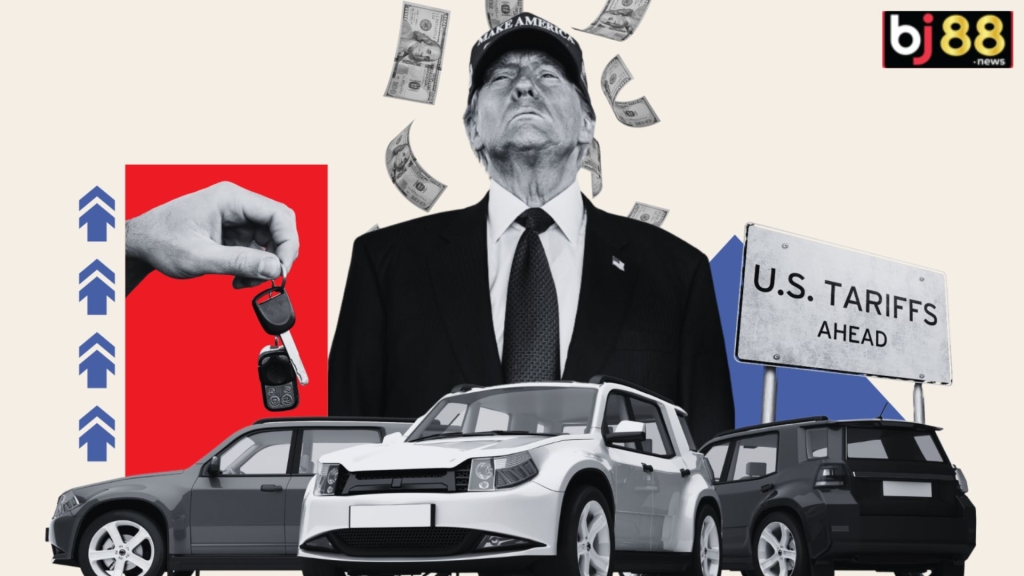A day after US President Donald Trump announced a 25% import tax on foreign cars and parts, major automakers around the world were left in shock, as the decision could seriously disrupt the industry.
On Thursday, investors reacted by selling shares of car companies in Japan, Germany, and the UK, causing billions in losses for brands like Toyota, BMW, and Jaguar Land Rover.
US car manufacturers were among the worst affected, with General Motors losing over 7% of its value.
However, Tesla, which has US-based factories and is led by Elon Musk—one of Trump’s key supporters—remained unaffected, with its stock staying stable.
Musk warned that even Tesla would feel the impact of the new tariffs.
“Just to be clear, Tesla is NOT unaffected,” he wrote on social media. “The cost increase is significant.”
Tesla’s Model Y, ranked as the most American-made car for the third year by Cars.com, still gets only 70% of its parts from the US, according to researcher Patrick Masterson.
“No vehicle is 100% US-made,” he pointed out.
Consumers will likely see price hikes across all brands, and no automaker, including Tesla, will be spared.
The new tariffs could impact $300 billion to $400 billion in imports, covering nearly 10% of everything the US brings in each year. Prices could rise by $4,000 to $12,000 per vehicle.
Many car companies have factories in the US but still import models or parts from overseas.
For example, Toyota has 10 US plants, and its Highlander SUV ranks high on the American-made list, but its Prius is imported from Japan. General Motors sources parts from Korea and Mexico, while Volkswagen depends on these countries as well, despite assembling the Atlas SUV in the US.

Oxford Economics suggests some companies may shift production to US factories, but this could lead to higher prices and a major drop in production among America’s top trading partners.
European luxury car brands, like Jaguar Land Rover, Mercedes-Benz, and Audi, could face the biggest impact since they sell fewer but more expensive cars. Ferrari, which ships from Italy, has already raised prices by 10% to cover the new tariffs.
To handle the 25% tariff increase, companies may either raise prices, take lower profits, or even stop selling certain models in the US, reducing choices for American buyers.
Patrick Anderson, CEO of Anderson Economic Group, warned that automakers with limited US production, like Jaguar Land Rover and Porsche, may cut manufacturing in their home countries, affecting jobs.
Mitsubishi, which imports all its cars to the US, and Hyundai, which recently announced a new US plant but still relies heavily on South Korean imports, may also feel the pressure.
Trump, who first talked about car tariffs during his initial term, has now said his latest tariff plan will be permanent, claiming it will strengthen America’s manufacturing industry.
This follows earlier tariffs of at least 20% on goods imported from China and 25% on some products from Canada and Mexico. The US has also already imposed a 25% tax on all imported steel and aluminum.
Trump is also planning to introduce “reciprocal tariffs,” which will be applied to specific countries based on their trade balance with the US.
The White House announced that car tariffs will begin on April 3, while tariffs on certain car parts will take effect a month later.
For now, auto parts from Mexico and Canada—previously allowed under a free trade agreement—will be excluded while officials set up new customs systems. However, the White House says this exemption is temporary.
While this temporary exemption provided some relief to the industry, General Motors could still face extra costs of about $10.5 billion, according to JP Morgan. Ford’s costs are estimated to start at around $2 billion and could more than double as more tariffs take effect.
JP Morgan predicts that the total added costs across the auto industry could exceed $80 billion.
Jennifer Safavian, president of Autos Drive America, which represents international carmakers, said companies are still assessing the impact of these tariffs and others recently introduced.
However, she warned that the tariffs would lead to higher prices, fewer sales, and lower production in the industry.
“They’re still figuring it out,” she said. “But there’s no doubt that these tariffs will affect the US auto industry.”













